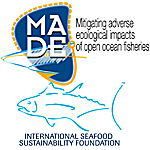Blue shark (Prionace glauca) is an abundant and cosmopolitan pelagic shark species, inhabiting tropical and temperate regions of the world's oceans. However, blue shark populations are subjected to an increasing pressure as a consequence of the growing international demand for shark products. They are the mostly caught shark species worldwide, mainly as bycatch in the longline fisheries for tuna and swordfish. While their stock status in the North Atlantic remains ambiguous, demographic and risk analyses showed that overall population growth is strongly dependent on the survival of the juvenile segment. Given their complex sexual and life stage segregation in both space and time, this could represent an opportunity for managing this species in a sustainable way. Juvenile blue sharks are very abundant in the waters around the Azores, in the central North Atlantic. This nursery function could provide the region with a key role for the management of this species, but very little is known about the spatial behaviour of juveniles and their movements in and between nursery areas. Here we present an analysis of their spatial ecology based on a combination of data from fisheries and satellite tracking. The results reveal the dynamic nature of the juvenile habitat, covering large parts of the North Atlantic and the function of the region as an alternating seasonal nursery for male and female blue shark.
- Presentation

 PDF version
PDF version
